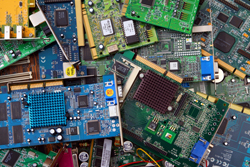Helping SMEs to compete in e-waste recycling
The volume of 'e-waste' or waste from electrical and electronic equipment (WEEE) in the EU is growing by between 3 and 5\;% per year. SMEs have traditionally dominated the recycling industry, however in recent years they are being forced out of the WEEE sector as bigger companies move in and consolidate the industry. There are several factors behind this trend. Many countries implemented the EU's WEEE- and Battery Directives in a way that calls for collective approaches. Meanwhile, big secondary raw material processors are more interested in few big contracts than lots of small contracts. HydroWEEE is an EU-funded collaborative research project aiming to enable SMEs to compete again in this growing industry. The research team is developing a mobile plant to recover base and precious metals from lamps and spent batteries using hydrometallurgical processes. They aim to be able to recover metals, such as copper, manganese, zinc, yttrium and indium, which is pure enough (generally about 95\;%) to be used directly for electroplating. The mobile plant enables several SMEs to work together, bypassing bigger recyclers and secondary material processes. They can reach the quantities of recovered materials needed to compete in the market, whilst minimising the investments needed. The project started in March 2009 and will last for 30 months, with seven partners from four countries – Italy, Austria, Romania and Serbia. So far the team has analysed the markets for each of the different components of WEEE, such as liquid crystal displays (LCDs), lamps, cathode ray tubes (CRTs), printed circuit boards (PCBs) and batteries. They have developed and tested hydrometallurgical processes for each. Existing recycling facilities have already been adapted and tested using the new processes. And a mobile unit has been developed based on the pilot studies, with planned delivery in autumn 2010. Further development of the system is ongoing. The HydroWEEE partners have created a joint company to use the new system. The projected outcome is impressive, with the coordinators estimating potential revenues of EUR 100 million - around 100 times the total cost of the project and 130 times the EU-funding - involving 150 SMEs.

